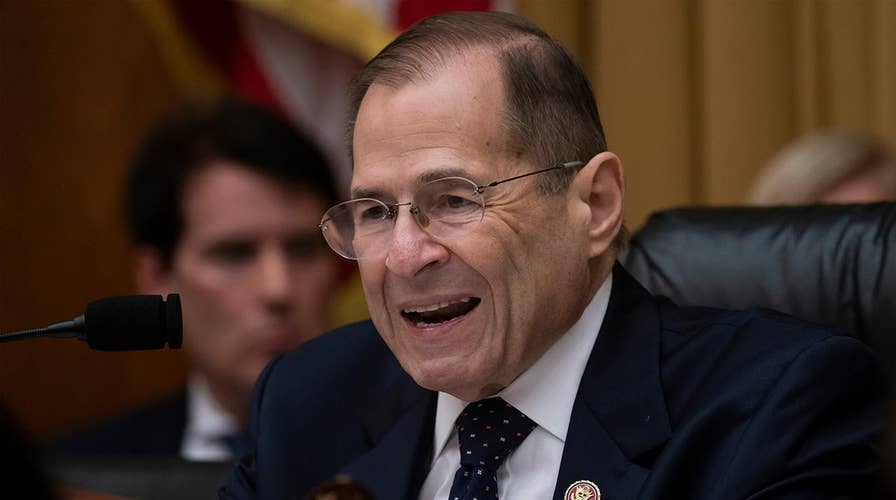Rep. Jerry Nadler says we are now in a 'constitutional crisis'
South Dakota Republican Sen. John Thune says House Judiciary Committee Chairman Jerry Nadler's comments are hyperbolic.
House Judiciary Committee Democrats on Friday introduced a bill that would ensure presidents can be held accountable for alleged criminal conduct -- a direct swipe at the White House amid the heated battle over Special Counsel Robert Mueller’s report.
The legislation, introduced by committee Chairman Jerrold Nadler, D-N.Y. and committee members Reps. Eric Swalwell, D-Calif., and Ted Deutch, D-Fla., would pause the statute of limitations for any alleged federal offenses committed by a sitting president, whether it was committed before or during the president’s term in office.
HOUSE PANEL VOTES TO HOLD BARR IN CONTEMPT, AS TRUMP ASSERTS EXECUTIVE PRIVILEGE OVER MUELLER FILES
"No person can be permitted to evade accountability for their actions just because they happen to be president," Nadler said in a statement on Friday. "I have concerns with the Justice Department interpretation that a sitting president cannot be indicted, but if that is the policy, a president who commits a crime before or during their term in office, could exploit this loophole and avoid prosecution just because the statute of limitations has run out. This is unacceptable. The presidency is not a get-out-of-jail-free card."
The Justice Department has a longstanding policy that a sitting president cannot be indicted. Swalwell said he disagreed with that legal opinion, and said Congress “can step up right now and change the law” to make sure “no president can evade punishment just by running out the clock.”
He added: “President Trump is living proof of the urgent need to close this loophole.”
Most federal criminal offenses carry a five-year statute of limitations, according to the committee. The legislation would pause that limit to ensure a president who's not prosecuted while in office for an alleged crime can still be “held accountable.”
The introduction of the bill comes days after the committee voted to hold Attorney General Bill Barr in contempt of Congress for defying a subpoena to provide the full and unredacted Mueller report and all underlying documents and evidence.
Barr released a version of the report last month, with limited redactions for sources and methods and grand jury material. Democrats in Congress are fighting for the release of the full report. Last month, Barr made a minimally-redacted version of the report available to certain members of Congress, including Nadler. Nadler, though, has not reviewed that version of the report.
MUELLER'S OPEN-ENDED REPORT COMPARED TO COMEY'S CLINTON SLAM: 'EQUALLY PROBLEMATIC'
Mueller's nearly two-year investigation found no evidence of collusion between members of the Trump campaign and Russia during the 2016 presidential election. Mueller also led an inquiry into whether the president obstructed justice, but did not come to a conclusion on the matter. Barr, after reviewing the report, said the investigation did not find evidence sufficient to charge the president with an obstruction of justice offense.
Some congressional Democrats, though, argue that the report contained evidence of obstruction by Trump.
Amid the battle between the White House and the committee on Wednesday to obtain those documents responsive to the subpoena, the president asserted executive privilege over the materials in a bid to protect them from release.
It is unclear when the full House could vote on whether to hold Barr in contempt.





